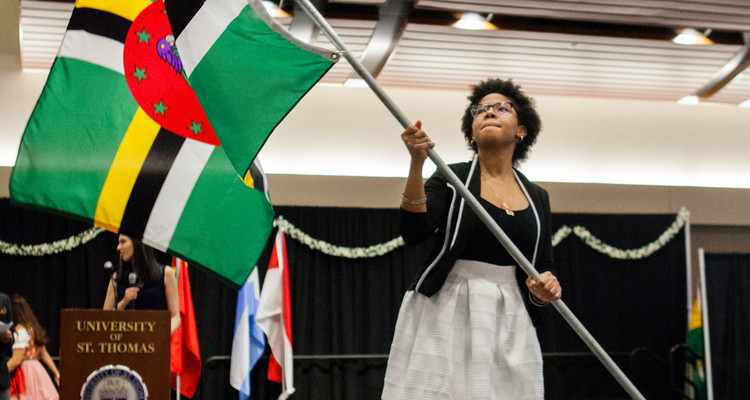With the onslaught of natural disasters the last few months, it can be easy to forget that behind the statistics are real people. For senior Chelsea Balthazar, that reality is all too difficult to ignore.
Balthazar is from the Commonwealth of Dominica, an island of about 289 square miles and 70,000 people, southeast of Puerto Rico and the Dominican Republic. It was also the first place to be hit by Hurricane Maria.
Many of Balthazar’s immediate family still lives in Dominica, including her mother, father, two younger sisters, grandmother, dog, and several aunts and uncles. She watched as Maria gathered strength, transformed into a Category 5 hurricane and hit her home island on Sept. 18. Maria is the strongest hurricane to hit Dominica and the only Category 5 hurricane to strike the island.
“I just wanted everyone to be alive,” Balthazar said. “I didn’t care about the house. I just wanted no loss of life. You can’t give back life. Things can be rebuilt.”
Even now, we are only beginning to understand the true impact Maria has had there: It stripped Dominica of much of its vegetation and rainforests, destroyed or damaged an estimated 90 percent of structures, and currently has a death toll of 34 people.
With the island cut off from communication, Balthazar waited in Minnesota to hear news of her family. She remained in contact with family members in the United States and Canada, as well as other Dominica students who attend universities in the United States.
Balthazar said she was on social media constantly; it was difficult because there was so little information at first and, when news did break, it emphasized how catastrophic the hurricane has been for Dominica. A CNN headline days later read that Dominica had been “knocked to its knees” while a recent Guardian article described Dominica as being “in tatters.”
“We saw everything totally destroyed,” said Sergio Da Silva of the U.N. Disaster Assessment and Coordination team in the Guardian article.
“There are no leaves on any trees,” Balthazar said. “Trees are down. Rivers are flooded. Bridges are gone. Entire houses of people were swept away. The death toll is still counting. People are missing. People haven’t heard from their families. It’s just mass destruction. ... Everyone was affected by this hurricane, whether you were there or you were abroad. You could not function because you had no idea what’s going on.”
It wasn’t until Sunday, Oct. 1, that Balthazar received word from her family. On a brief satellite call with her mother, she learned her family members were all alive, but Balthazar still has no idea of their health or well-being, or of physical damage.
She added that at the end of the call, her mother told her to go study.
While Balthazar has been at St. Thomas, she’s considered how she can best use her school community to support her family community. She has shared her story with professors, the Office of International Students and Scholars, and the Center for the Common Good.
“First, we remember all who have been affected by these catastrophic events in our thoughts and prayers,” read a statement released by the Center for the Common Good. “In addition to prayer, we as a community are encouraged to donate what we are able to disaster relief and recovery efforts – and there are many organizations whose mission is to respond to such crises.”
The statement recommended Catholic Charities USA; Charity Navigator for those who wish to focus on relief and recovery; and United Way, and St. Thomas will kick off a United Way campaign on Oct. 9.
Balthazar said that it was also important for people to witness and acknowledge what has happened not only in Dominica but the many other places currently affected by trauma.
“Puerto Rico was hit. My island was hit. A few weeks before, Irma hit Florida. Harvey hit Houston. There were earthquakes in Mexico. People in Bali had to be evacuated, because there was an active volcano,” Balthazar said. “I think it’s good for people to be aware of what’s going on in your country, but it’s also good to have a global perspective on what is happening in the world.”
She said the week of Oct. 2 was a little easier for her than the week the hurricane hit. Despite her phone call with her mother, her worry is still evident; she is accustomed to communicating often with her family and doesn’t know when she’ll speak with them again as the island begins its road to recovery. She likely won’t travel home until May.
However, Balthazar emphasized she believes it’s important for people to remember that something shouldn’t have to affect them personally for them to care.
“We need to care about the world. We need to be compassionate to everyone,” she said.







